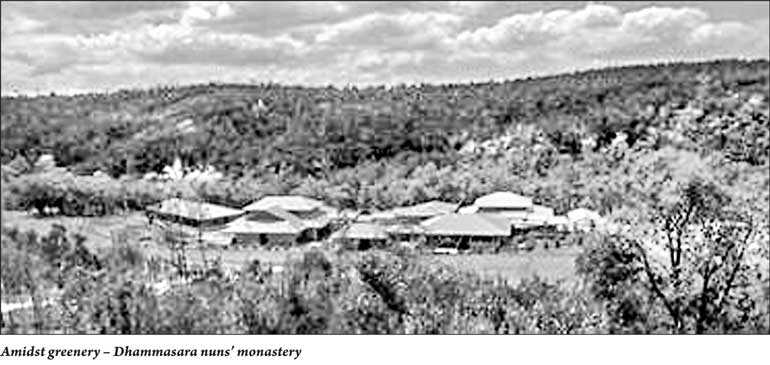Sunday Feb 15, 2026
Sunday Feb 15, 2026
Saturday, 2 November 2019 00:02 - - {{hitsCtrl.values.hits}}

This week marks the completion of 10 years since the Bhikkhuni order was formed in Australia. It meant higher ordination of nuns into the Theravadin tradition of Buddhism. It was ushered as “a momentous occasion” and one of “the greatest achievements” for the Buddhist Society of Western Australia (BSWA).
“It was not without controversy. There were some very influential monks inside our world-wide Theravadin family who tried to stop it. Such is the nature of power and grasping to keep the status quo,” says BSWA President Dennis Sheppard.
“Happily, we were able to hold our ground to see, on 22 October 2009, at Bodhinyana Monastery, the Abbess at the time Ajahn Vayaama, together with Venerables Nirodha, Seri, and Hasapnna, being ordained as Bhikkhunīs by a dual Sangha act performed by Bhikkhus and Bhikkhunīs in full accordance with the Pali Vinaya.”
BSWA took the initiative in setting up a separate nuns’ monastery in 1998 when the Venerable Ajahn Vayaama came to live in a temporary caravan on a beautiful 583-acre site. The land was purchased by BSWA in Gidgegannup, a short distance outside of Perth, and the monastery titled ‘Dhammasara’ was established.
Writing to the commemorative issue of the BSWA, the President says: “The energy and goodwill that has flowed into this project is legendary, with financial and ‘support-in-kind’ that has been quite unbelievable. From large anonymous donations through to bequests that have seen this monastery flourish,” says the President.
“However, we all know that building a physical place is one thing, but to make a monastery ‘sing’ you need monastics who are dedicated and who practise well. It is this aspect that truly inspires and provides lasting benefit to the wider community.
“Dhammasara is now well established and is flourishing. We have nuns who live impeccable lives, but most important for this celebration is that we have nuns who have equality in the monastic order. This has been a dream for the BSWA from the beginning. The Four Pillars of Buddhism – monks, nuns, laywomen, and laymen – work beautifully together in our BSWA, just as the Buddha originally instructed. The BSWA is very proud of our Bhikkhunīs. What they have achieved over the past ten years is nothing short of amazing.”
The initiative in establishing a Bhikkhuni order was taken by Venerable Ajahn Brahmavamso amidst much criticism. Ajahn Brahm was in UK at the time it happened and writes of the reactions:
“There was a growing wave of awareness among the senior monks in UK, and in Wat Pah Pong in Thailand, that a legitimate Bhikkhunī ordination was about to occur in Australia. The wave soon turned into a tsunami of fear and dread. This must be stopped!
“There was a very easy way to stop the ordination, but the detractors did not know the Vinaya (monastic rules) well enough. If they had sent a couple of monks to Perth and they had camped out in our Sima Hall, then there would have been no way for us to proceed. The ordination ceremony, as with all formal decisions, can only be done when the Sangha who happen  to be in that monastery come together and approve it unanimously. Just a single monk objecting would have prevented the ordination.
to be in that monastery come together and approve it unanimously. Just a single monk objecting would have prevented the ordination.
“I arrived from UK on the afternoon of the ordination day and was met by Ajahn Brahmāli. It was all systems go! We rehearsed our chanting in the van on the journey from the airport to Bodhinyana. The ordination went smoothly. As I left the Sima Hall and went to my cave jet lagged and exhausted, I may have thought: ‘That was a small step for one monk, and a HUGE step for ‘nunkind’. The rest, as they say, is history. And we knew that we would be on the right side of history. The Bhikkhunī Sangha in Western Australia have their own monastery now, Dhammasara, which is awesome. Furthermore, by the time that this article is published, I will have received the medal that signifies that I am a member of the Order of Australia, issued in Her Majesty the Queen’s 2019 Birthday Honours list, for services to Buddhism and gender equity. That affirms that it was the right thing to do.”